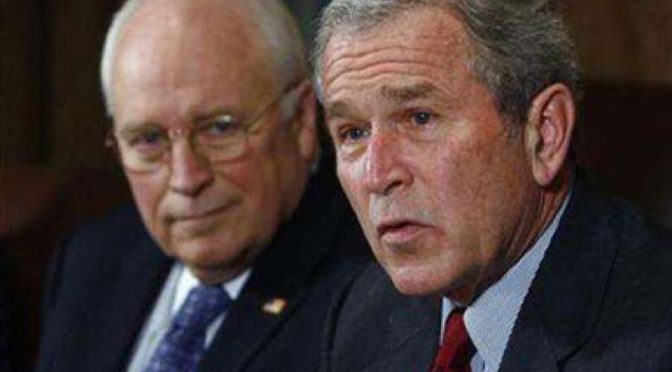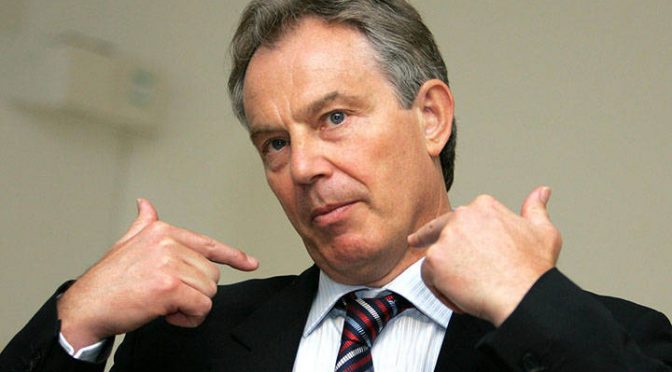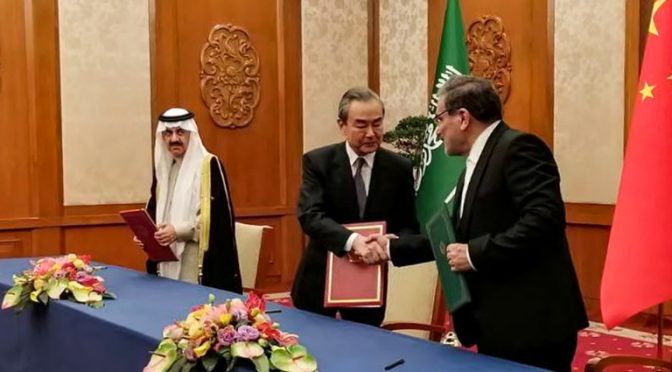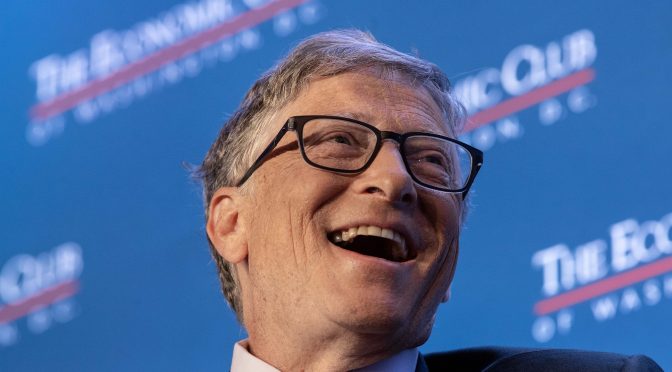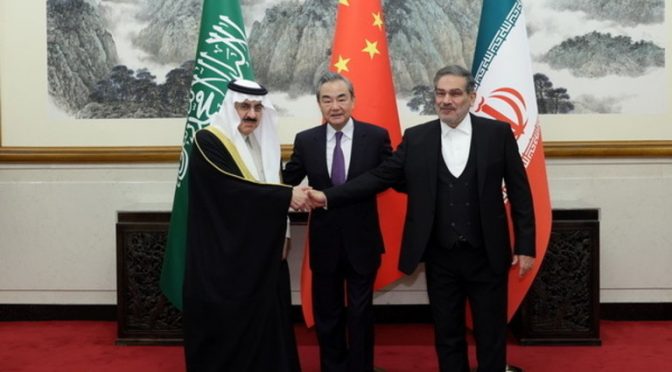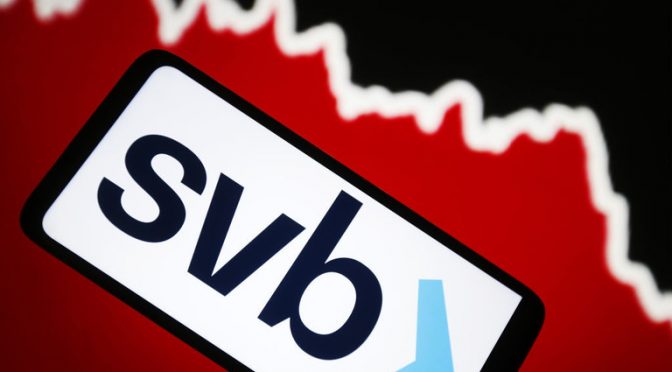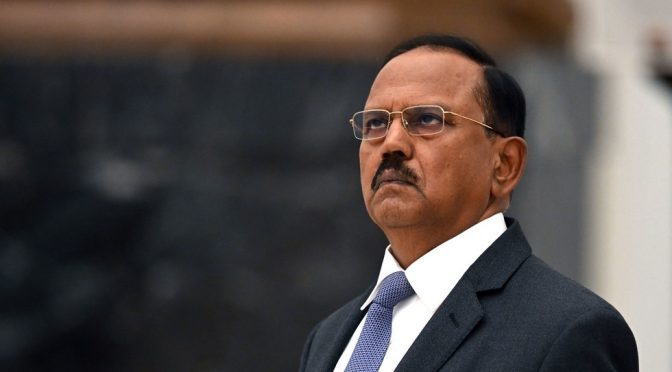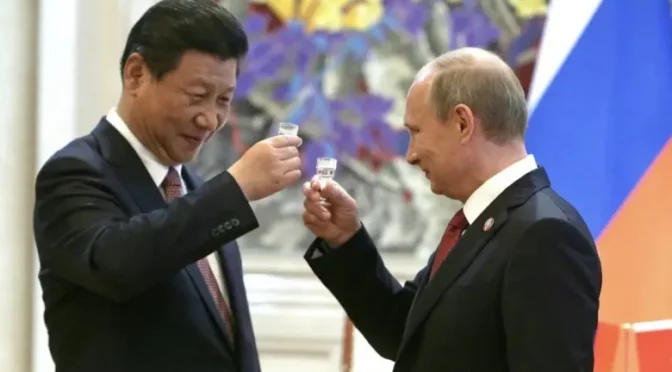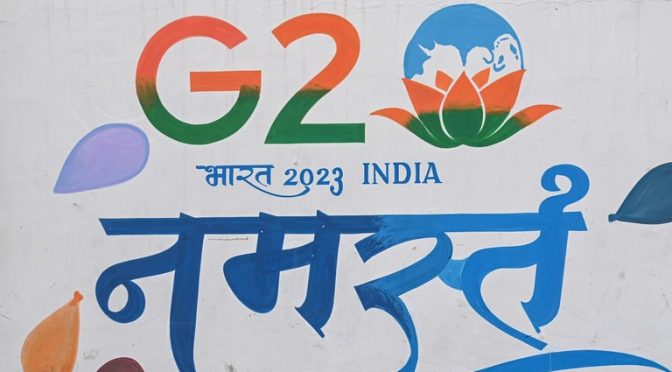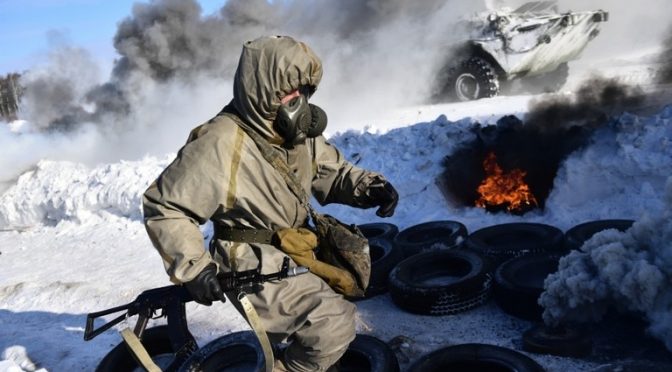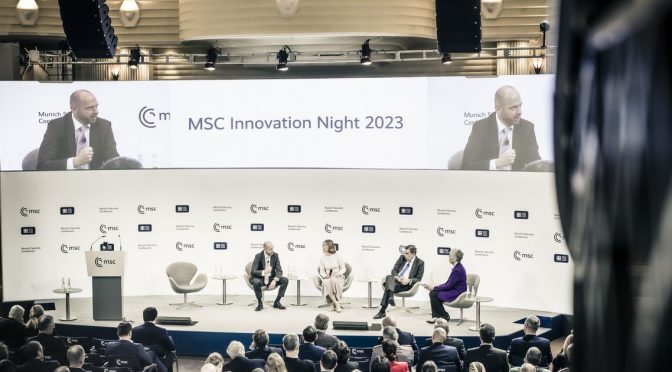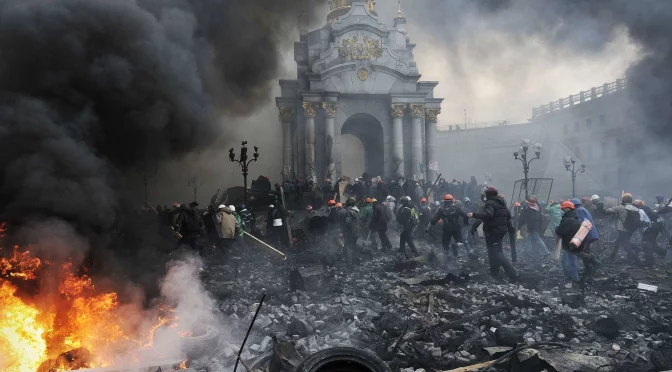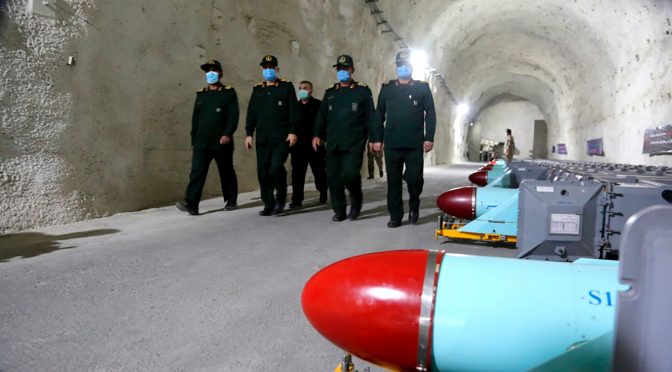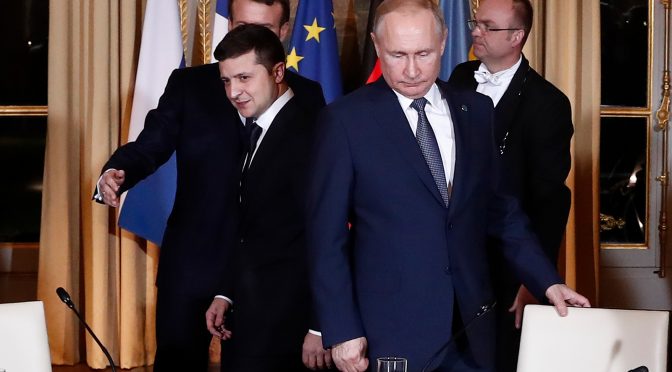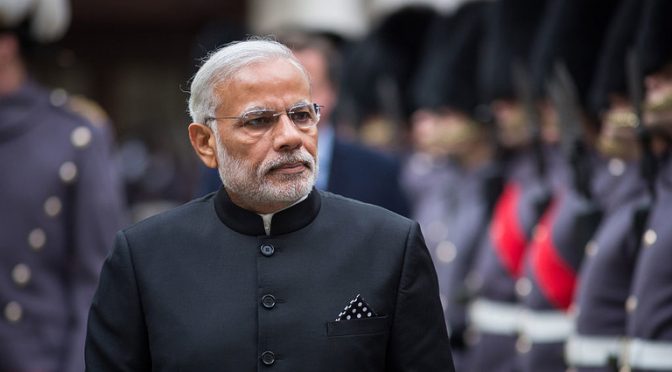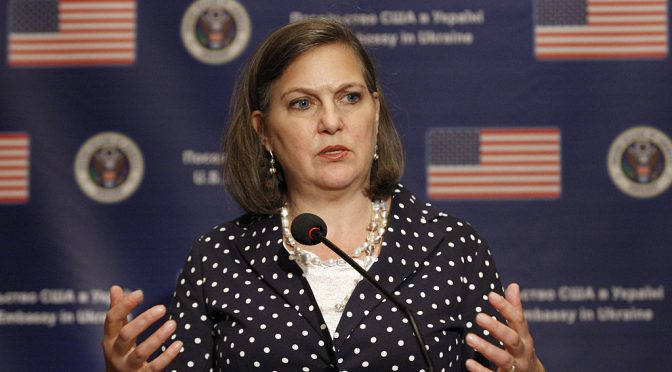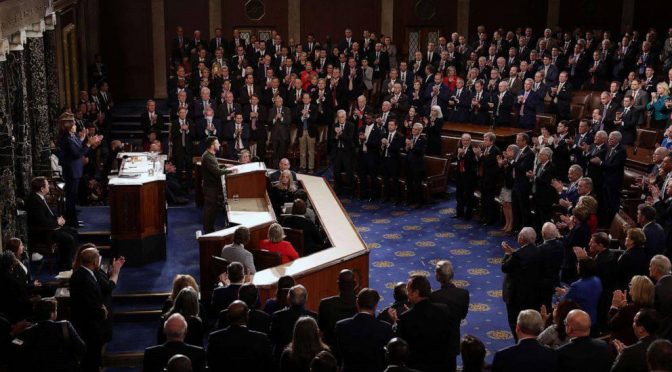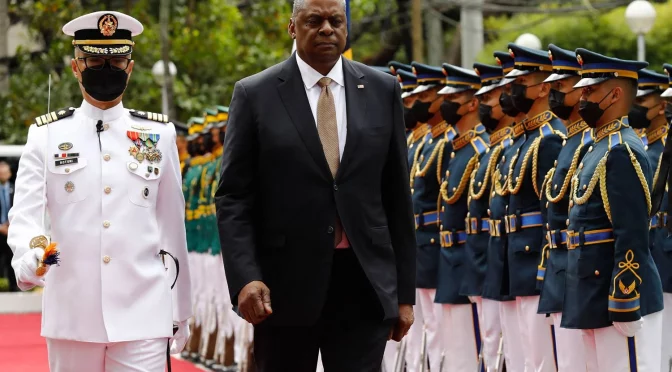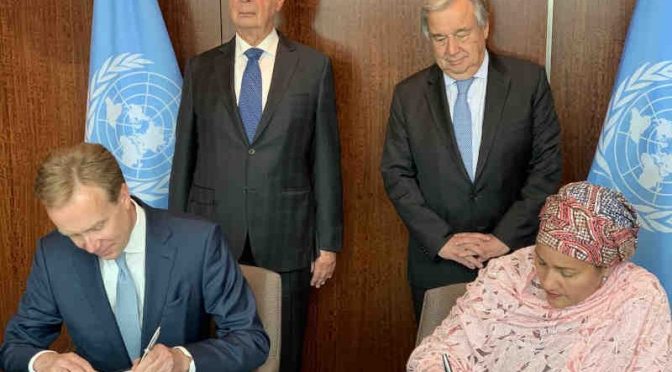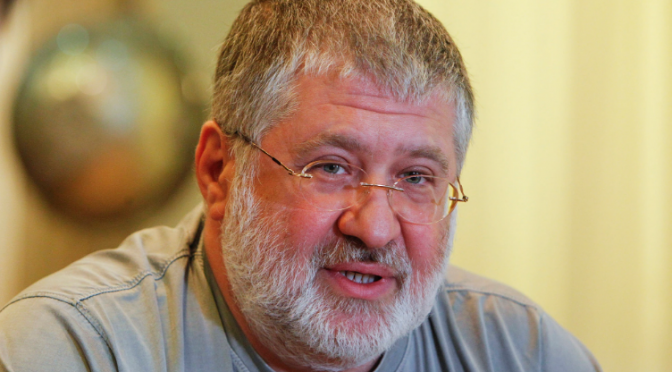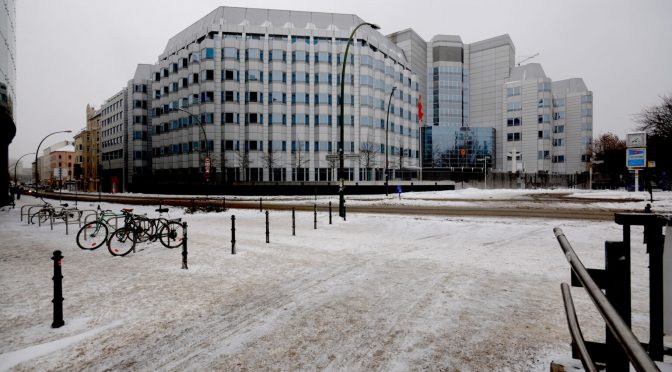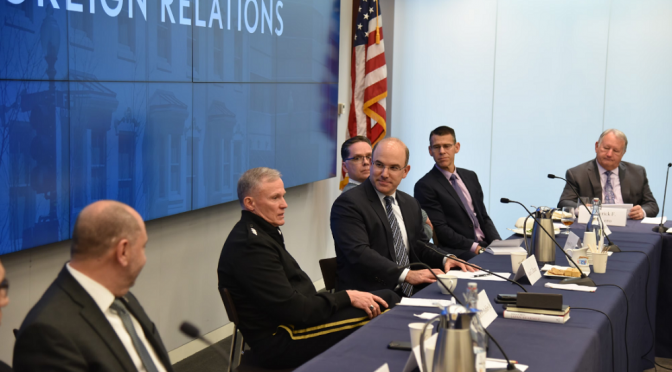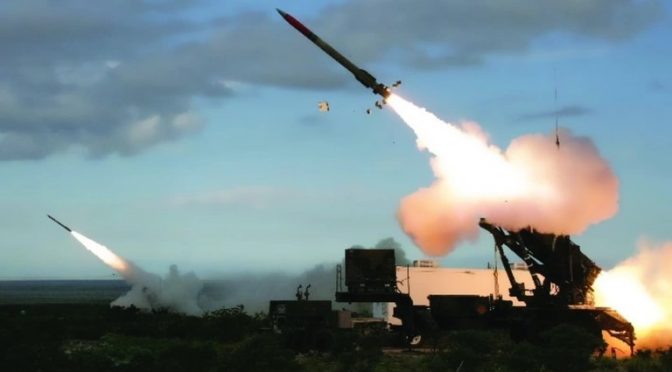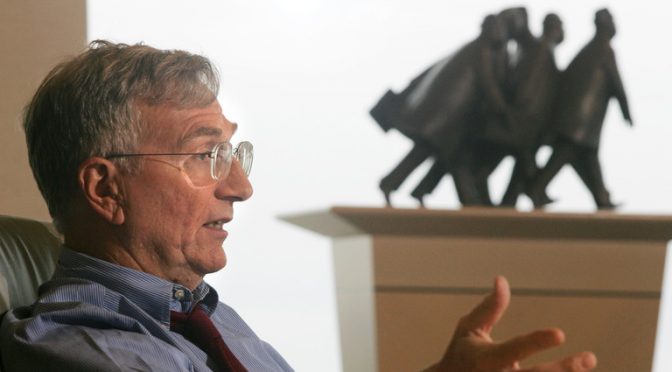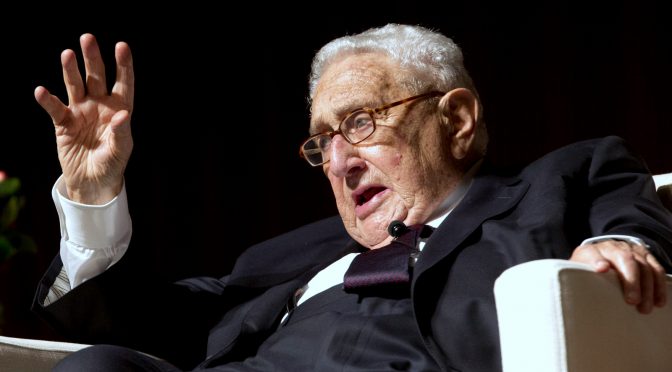The former senior executive says the Fed must cut rates and guarantee deposits held by regional lenders.
Continue reading Another 50 US Banks Could Fail | ex-Lehman VPAll posts by Geopolitics101
Multipolarity was Triggered by the 2003 US Invasion of Iraq
Twenty years after the unlawful and destabilizing US-led invasion of Iraq, Washington must face the ultimate consequence of that war: UNSC powers China and Russia laying the foundation for a genuine, UN Charter-based system of multipolarism.
Continue reading Multipolarity was Triggered by the 2003 US Invasion of IraqWest’s Contempt for Truth is Leading Us to Ruin
If today’s geopolitics were a tennis match, this would be a 6:0, 6:0 for Russia. It is almost surreal to contemplate the changes that took place over the past 12 months.
Continue reading West’s Contempt for Truth is Leading Us to RuinThe Middle East frees itself from the West
The reconciliation between Saudi Arabia, leader of the Sunni Muslim world, and Iran, leader of the Shiite Muslim world, finally makes possible an era of peace in the Middle East. It was made possible by Russia, ally of the two enemy brothers, and negotiated first in Iraq and Oman before being concluded by China, Iran’s millennial ally, acting impartially. This agreement closes eleven years of wars and Western influence.
Continue reading The Middle East frees itself from the WestBill Gates, Vaccinations, Microchips, and Patent 060606
There are many conspiracy theories – some believe that reptilians are running the US government and others believe that Coca-Cola uses the blood of Christian babies to produce its soft drinks.
Continue reading Bill Gates, Vaccinations, Microchips, and Patent 060606Dozens of US Banks at Risk of Repeating SVB Collapse – Study
Many other lenders are also sitting on unrealized losses caused by the rapid rise in interest rates.
Nearly 200 American banks face similar risks to those that led to the implosion and bankruptcy of Silicon Valley Bank (SVB), according to a paper posted this week to the Social Science Research Network. SVB, a major US lender focused on the tech and startup sectors, was shut down by regulators last week after massive deposit outflows.
In the study, four economists from prominent US universities estimated how much market value the assets held by US banks have lost due to recent interest rate hikes.
“From March 07, 2022, to March 6, 2023, the federal funds rate rose sharply from 0.08% to 4.57%, and this increase was accompanied by quantitative tightening. As a result, long-dated assets similar to those held on bank balance sheets experienced significant value declines during the same period,” they wrote.
Although higher interest rates can benefit banks by allowing them to lend at a higher rate, many US banks have parked a significant portion of their excess cash in US Treasuries. This was done when interest rates were at near-zero levels. The value of these bonds has now greatly decreased due to the rate hikes – investors can now simply purchase newly issued bonds that offer a higher interest rate. The decline in the banks’ portfolios is unrealized, meaning the value of the securities has declined but the loss is still only ‘on paper’.
The problem arises when customers request their deposits back and banks are forced to sell their securities – at a significant loss – in order to pay depositors back. In extreme cases, this can lead to a bank becoming insolvent, or as happened with Silicon Valley Bank, the loss of confidence can trigger a bank run.
The report’s authors looked into how the amount of US lenders’ funding that comes from uninsured deposits: the greater the share, the more susceptible a bank is to a run. For instance, at SVB, where 92.5% of deposits were uninsured, the deposit outflow caused the bank to collapse in a span of only two days. The authors of the study calculated that 186 American banks do not have enough assets to pay all customers if even half of uninsured depositors decide to withdraw their money.
“Our calculations suggest these banks are certainly at a potential risk of a run, absent other government intervention or recapitalization… Overall, these calculations suggest that recent declines in bank asset values very significantly increased the fragility of the US banking system to uninsured depositor runs,” the economists concluded, noting that the number of banks at risk could be “significantly” larger if “uninsured deposit withdrawals cause even small fire sales.”
SVB’s failure sent ripples across the entire US banking industry and caused the closure of another lender, Signature Bank. Many other financial institutions have seen their stocks plunge, with the six largest Wall Street banks losing around $165 billion in market capitalization, or some 13% of their combined value. Earlier this week, the ratings agency Moody’s downgraded its outlook for the US banking system from ‘stable’ to ‘negative’, citing the “rapidly deteriorating operating environment.”
How The US Banking Crisis Could Lead to The Collapse of The Western Financial System
The growing number of institutional failures is a signal that the entire economic system is under pressure.
Continue reading How The US Banking Crisis Could Lead to The Collapse of The Western Financial SystemHow the China-brokered Saudi-Iran Deal will Change the Middle East
Last week, Saudi Arabia and Iran announced a landmark deal, brokered by China in Beijing, to formally restore diplomatic relations. The agreement saw the two sectarian arch rivals in the Middle East agree to put aside their differences and to normalize ties.
It was the first ever deal of its kind overseen by China, framing itself as a peacemaker, and showing that its commitment to have good relations with every country in the region is not just based on rhetoric but actual substance. Some have described it as a sign of a “changing global order.”
To put it mildly, it is bad news for the United States and deals a massive blow to the near-unlimited geopolitical sway Washington has long held over the region via its strategic relationships with countries such as Saudi Arabia.
Additionally, it effectively ruins a US led campaign to pressurize and isolate Iran and hinders American efforts to shape regional politics in Israel’s favor via the Abraham Accords. It is no surprise that the Western media is calling the Chinese-brokered deal a “challenge” to the international order, but what order is that? The ability of the US to dominate the Middle East? Perhaps brokering peace is a good thing.
US foreign policy in the Middle East
Since the decline of European colonial empires, the United States has been the sole military hegemon in the Middle East, using a network of partnerships from Israel to the Gulf States to sustain domination over the region and allowing the US to exploit its energy resources. In order to maintain this position, the US has long needed adversaries in order to perpetuate an ongoing security dilemma and force reliance on it as a security guarantor, which is also beneficial to the US military industrial complex. These policies have accumulated decades worth of wars, insurgencies and attempts at regime change.
Detractors to the US agenda have included revolutionary Arabist regimes, such as Saddam Hussein’s Iraq and Bashar Assad’s Syria, terrorist groups such as Al-Qaeda and ISIS, and of course the post-1979 Islamic Republic of Iran. It was after the US gave up on its botched attempt to topple Assad that policymakers in the Trump administration decided to focus on Tehran, tearing up US participation in the Joint Comprehensive Plan of Action (JCPOA) and imposing a crippling sanctions regime. In retaliation, Iran has waged a series of proxy conflicts against US partners in the region, most notably assisting the Houthis in Yemen against the Saudi-backed government, which has overseen the carpet-bombing of occupied regions.
China’s policy in the Middle East
Unlike the United States, China’s policy in the Middle East is non-interventionist, and assumes a neutral posture in regional conflicts, taking a position of respect for national sovereignty. However, this does not mean Beijing has no interests in the region. As it grows and develops domestically, its need for secure access to energy resources has increased, leading it on a diplomatic push to build good relations with every country in the region, and this has only accelerated as the US has pushed to isolate China from the West. Despite the intra-regional power struggle, in the past two years, Beijing announced strategic partnerships with both Iran and the Gulf States.
Multipolarity
Because China did not have the same military footprint or stakes in the Middle East as the US, many analysts were dismissive of Beijing’s ability to seriously act as a diplomatic mediator in the region. They believed that its attempts to build good ties with everyone were spread too thin. However, the Saudi-Iran deal shows this assumption was wrong. But how did it happen?
First, it should be noted that the Gulf States are not “value” allies to the US in the way European countries are, and not “morally obligated” to follow the American cause. Rather, they are self-interested monarchies with very different ideological and value systems (strict Wahhabi Islam) and have seen the US as a “patron” in guaranteeing their economic and security interests (oil for weapons). This is not a “marriage”, just business.
It should be understood that the world has changed in ways which now lead these states to perceive that unparalleled US dominance, which is its unequivocal foreign policy goal, is no longer in their best interests. They have found a new, bigger partner in Beijing who not only can buy more of their oil, but also doesn’t have a foreign policy doctrine premised on evangelizing its ideology or creating war throughout the region. As such, when the US delivered an ultimatum to the United Arab Emirates that they will block the export of F-35s if they don’t drop Huawei from their 5G networks, Abu Dhabi told Washington where to go.
While this shift was already underway by 2022, events last year exacerbated it further as the Gulf States suddenly found the US demanding that they take sides in a war – in Ukraine – which did not concern them, and worse still, demanding that they compromise their own economic interests to suit its sanctions agenda.
The US fell out with OPEC, and Saudi Arabia publicly rebuffed its demands to increase oil production. Meanwhile, the events of that year also emboldened Iran, who was not being swayed by US pressure, while the return of Benjamin Netanyahu to power in Israel exacerbated Arab-Israeli tensions, damaging the US backed Abraham Accords, and hindering Saudi Arabia’s willingness to normalize with Israel.
These events have ultimately created the political space for a diplomatic reconciliation between Saudi Arabia and Iran, backed by China. It’s a massive blow to American interests as it is the first major Middle East deal brokered without Washington’s influence, and subsequently dilutes its policy of creating a perpetual war machine in order to legitimize its footprint in the region and its clout over Arab States.
It also shows that the US campaign to try and isolate and crush Iran has failed, and that the United States no longer holds the power it once did to isolate countries. If the US is wise, it should use this development to rethink its approach to the Middle East, but if other policies are anything to go by, the Washington circle is likely to continue to think every problem is a nail, and more hammers are needed.
Over $250 Billion Swindled from US Pandemic Fund
Three government agencies told Congress that the stated sum is actually conservative and the true figure could be much greater.
Continue reading Over $250 Billion Swindled from US Pandemic FundBillionaire Warns of Dire Aftermath of SVB Collapse
Bill Ackman says the government made “a-soon-to-be-irreversible mistake” in its treatment of the failed bank.
Continue reading Billionaire Warns of Dire Aftermath of SVB CollapseSaudi Arabia and Iran to Restore Ties in China-Brokered Deal
After seven years of tension, Riyadh and Tehran will reopen embassies and revive a 2001 security agreement.
Continue reading Saudi Arabia and Iran to Restore Ties in China-Brokered DealIn a Multipolar World, the Idea of a New World Order Dies
When former US President George W. Bush and his neocon regime launched their anti-terrorism campaign after the September 11th attacks, he declared that “Every nation, in every region, now has a decision to make. Either you are with us, or you are with the terrorists.”
Continue reading In a Multipolar World, the Idea of a New World Order DiesIs US-NATO on a Collision Course with Russia? The Kremlin’s New Deterrence Strategy
Amid incessant NATO aggression and escalation of hostilities within Russia, now also including US-backed Kiev regime terrorists targeting schoolchildren, Moscow has started revamping the doctrinal approach to the use of its strategic arsenal.
Continue reading Is US-NATO on a Collision Course with Russia? The Kremlin’s New Deterrence StrategyAtomwaffen: How American Friends Of Ukrainian Fascists Plotted A Terror Attack in US
In normal circumstances, the Atomwaffen’s plot in Baltimore should have been headline news.
Continue reading Atomwaffen: How American Friends Of Ukrainian Fascists Plotted A Terror Attack in USNetanyahu’s Anthology of Errors, Fabrications & Falsehoods
If you don’t care about human rights violations and if you are a champion of war crimes, the Israeli prime minister’s new book, Bibi: My Story, is for you.
Continue reading Netanyahu’s Anthology of Errors, Fabrications & FalsehoodsZelensky’s Comic Insults… Gimme HIMARS, Tanks, F-16s and Now, America’s Sons & Daughters
The glib talk of people dying for no good cause, but rather only for a clique of clowns and their imperial circus, is the ultimate sick joke.
Continue reading Zelensky’s Comic Insults… Gimme HIMARS, Tanks, F-16s and Now, America’s Sons & DaughtersWho is India’s National Security Advisor and Why did Putin Decide to Meet Him One on One?
The Russian president has held a surprise meeting with AK Doval, PM Modi’s most trusted foreign and domestic aide.
Continue reading Who is India’s National Security Advisor and Why did Putin Decide to Meet Him One on One?Zelensky and His Cronies Are Trying to Cover Up a Major Corruption Scandal in Ukraine
Last month’s shockwave of resignations among top Ukrainian officials, caused by numerous corruption scandals, ended as quickly as it began. At the start of February, it seemed that Defense Minister Alexei Reznikov would become the ultimate victim of the purge. His imminent departure was openly discussed in the Ukrainian parliament and hints were even dropped by the President’s office.
Continue reading Zelensky and His Cronies Are Trying to Cover Up a Major Corruption Scandal in UkraineKiev Regime Flooding Black Markets with NATO-sourced Weapons
It has been at least a year and a half since the political West drastically intensified its weapons shipments to the Kiev regime. Ever since, the black markets have been flooded with Western-made arms and munitions, some of which have even started running out from NATO stocks.
Continue reading Kiev Regime Flooding Black Markets with NATO-sourced WeaponsUnderstanding the Logic of Canada Giving $2.26 Billion in Arms to Ukraine
Over the past year Ottawa has given Ukraine over $2 billion in weapons. The size of the arms donation is unprecedented in Canadian history.
Continue reading Understanding the Logic of Canada Giving $2.26 Billion in Arms to UkraineThe Stage is Set for A Full Blown Hybrid World War III
The strategists of Russia and China are now working full time on how to return all strands of Hybrid War against the Hegemon.
Continue reading The Stage is Set for A Full Blown Hybrid World War IIIG20 Foreign Ministers’ Meeting Likely to End in Deadlock with The Body’s Relevance Under Threat
Representatives of the world’s 20 largest economies are meeting in India amid discord over Ukraine and US-China tensions.
Continue reading G20 Foreign Ministers’ Meeting Likely to End in Deadlock with The Body’s Relevance Under ThreatUS Preparing False Flag Chemical Attacks in Ukraine
The Americans believe a provocation won’t be properly investigated due to the fighting, Russian military alleges.
Continue reading US Preparing False Flag Chemical Attacks in UkraineThe West’s Narrative of the ‘Russian Threat’: A Tool for Destabilization and Hegemonic Control
The Western world’s threat narrative seeks to disrupt the concept of multipolarity by imposing sanctions and military deterrence.
Continue reading The West’s Narrative of the ‘Russian Threat’: A Tool for Destabilization and Hegemonic ControlMunich Security Conference 2023: “Intensifying Authoritarian Revisionism”
MSC 2023 Attracts Historic Number of Congressional Attendees
It would seem ironic that the annual Munich Security Conference is traditionally set in Munich, Germany, the site of Adolf Hitler’s return in 1920 after his discharge from WW I service in the German army. Home to the Munich Putsch of 1923, it became the location from which the Workers Socialist Nazi party grew into a mass movement and political force throughout Germany; thus threatening the world.
Continue reading Munich Security Conference 2023: “Intensifying Authoritarian Revisionism”Biodigital Convergence: The Pandemic Started The Genetic Transformation Of Humanity
The Pandemic was never just about a virus and a “vaccine”. It was the first mass-scale application of synthetic biology to the human condition. As such, it transitioned theoretical Convergence science into applied science but on a global scale. For a world that mostly never heard of Transhumanism, they have arbitrarily been placed on the conveyor belt of transformation.
Continue reading Biodigital Convergence: The Pandemic Started The Genetic Transformation Of HumanityThe Ninth Anniversary of The War in Ukraine
We are not on the first but on the ninth anniversary of the war in Ukraine, which was unleashed in February 2014 with the coup d’état under US-NATO direction. Speaking from Warsaw, President Biden promised to “stand by President Zelensky no matter what.”
Continue reading The Ninth Anniversary of The War in UkraineCBDCs – The Good, The Bad, & The Downright Ugly
There has been much comment over the likelihood that central bank digital currencies will be introduced. I conclude they are unnecessary — a red herring. But it does allow us to discuss their possible relevance to a new Asian super-currency.
Continue reading CBDCs – The Good, The Bad, & The Downright UglyIran Establishes 2,200 km of Strategic ‘Underground Cities’
These strategic sites retain warships able to deploy drones, oceangoing helicopter carriers, missile-launching capabilities, and several other military innovations from the IRGC.
Continue reading Iran Establishes 2,200 km of Strategic ‘Underground Cities’Russia’s Sergey Glazyev Introduces the New Global Financial System
The world’s new monetary system, underpinned by a digital currency, will be backed by a basket of new foreign currencies and natural resources. And it will liberate the Global South from both western debt and IMF-induced austerity.
Continue reading Russia’s Sergey Glazyev Introduces the New Global Financial SystemPutin & Zelensky: Sinners and Saints Who Fit Our Historic Narrative
Washington has done what it always does, make its chosen wars a manichean conflict. But that doesn’t mean the press has to be so compliant.
Continue reading Putin & Zelensky: Sinners and Saints Who Fit Our Historic NarrativePutin’s ‘Civilizational’ Speech Frames Conflict Between East and West
In his Federal Assembly address, President Putin emphasized that Russia is not only an independent nation-state but also a distinct civilization with its own identity, which is in conflict and actively opposes the values of ‘western civilization.’
Continue reading Putin’s ‘Civilizational’ Speech Frames Conflict Between East and WestThe U.S. May Be the Biggest Loser in the War on Russia
Where does Europe go in the wake of the Nord Stream allegations? It is hard to see a Germany-dominated Europe diverging far from Washington.
Continue reading The U.S. May Be the Biggest Loser in the War on RussiaEarthquake is Punishment for Turkey’s Independence from WEF Globalism & NWO Agenda
Diana Iovanovici Sosoaca is a Romanian lawyer and far-right politician. She is a Romanian Senator of Romania for the Iasi County since December of 2020.
Continue reading Earthquake is Punishment for Turkey’s Independence from WEF Globalism & NWO AgendaThe World Teetering on the New Polycentric Geopolitics
The world is yet to see how dangerous the decade before us will be, what the new global geopolitical architecture will look like and who is to build it.
Continue reading The World Teetering on the New Polycentric GeopoliticsIndia’s Clash With The BBC is A Warning of Things to Come
Western powers are friendly with New Delhi now, but what happens when they begin to see it as a rival?
Continue reading India’s Clash With The BBC is A Warning of Things to ComeHow Much is U.S. Aid to Ukraine Costing You?
In 2022, the U.S. government approved expenditures of $113 billion on aid to Ukraine. The Committee for a Responsible Federal Budget writes:
Continue reading How Much is U.S. Aid to Ukraine Costing You?Victoria Nuland Confirms: US Supports Ukrainian Attacks on Crimea
Victoria Nuland, the undersecretary of state for political affairs, said last week that the US is “supporting” Ukrainian attacks on Crimea and called Russian military installations on the peninsula “legitimate targets.”
Continue reading Victoria Nuland Confirms: US Supports Ukrainian Attacks on CrimeaEndgame for Ukraine: America vs America
Bill Burns travelled (in secret) in mid-January to meet Zelensky. Was it to prepare Zelensky for a shift in the American stance?
Continue reading Endgame for Ukraine: America vs AmericaThe Death of Critical Thinking in America
Public education in the United States has always had very specific objectives.
Continue reading The Death of Critical Thinking in AmericaUS Militarization of The Philippines Has Begun
FILIPINOS have short memories indeed. Suppose one looks and closely examines most, if not all, of the country’s perpetual problems, which are recurrent precisely because we have short memories. We are not learning lessons from our historical experience as a country. We never learn from our history, which should have been our best teacher.
Continue reading US Militarization of The Philippines Has BegunUseless Eaters: Drug Them, Give Them Computer Games, Let Them Eat Bugs
I’ve seen several reports that ChatGPT, the new artificial intelligence program that’s all the rage, has been found to have a built-in bias against whites, Christians and Jews.
Continue reading Useless Eaters: Drug Them, Give Them Computer Games, Let Them Eat BugsThe Hunter Biden + Ihor Kolomoïsky affair
The Biden Administration is finally reacting to the scandals that have arisen from the computer of the president’s son, Hunter Biden. This loser, whose only known activities are those of a junkie and a pimp, managed to become the director of a large gas company; a job he knows nothing about.
Continue reading The Hunter Biden + Ihor Kolomoïsky affairNord Stream Terror Attack: The Plot Thickens
What’s left for all of us is to swim in a swamp crammed with derelict patsies, dodgy cover stories and intel debris.
Continue reading Nord Stream Terror Attack: The Plot ThickensImplications of US Destruction of Nordstream 2 Pipeline
The disturbing and detailed reportage by a Pulitzer Prize winning journalist Seymour Hersh on Washington’s sabotage of the Russian Nordstream 2 gas pipeline to Germany now provides new perspective on the momentous series of geopolitical trends that began with the war in Ukraine.
Continue reading Implications of US Destruction of Nordstream 2 PipelineAmerica is a Prison Disguised as Paradise
“If all that Americans want is security, they can go to prison. They’ll have enough to eat, a bed and a roof over their heads. But if an American wants to preserve his dignity and his equality as a human being, he must not bow his neck to any dictatorial government.”— President Dwight D. Eisenhower
Continue reading America is a Prison Disguised as ParadiseCrimea and the Final War
A suicidal oligarchic elite deluded by their own lies, propaganda, and self-serving myths.
Continue reading Crimea and the Final WarEngineering a Cult of Chaos to Undermine Rational Thinking
If one tries to use rational thought processes to produce a reasoned explanation for that which is neither rational nor reasoned, one will end-up building a false picture of the world around one.
Continue reading Engineering a Cult of Chaos to Undermine Rational ThinkingLatest Scoreboard: Russian Special Denazification Ops vs. Ukraine
The casualties of Ukraine, which was on the ground with 734 thousand soldiers (plus 100 thousand reservists) and NATO officers, soldiers and mercenaries, are as follows:
Continue reading Latest Scoreboard: Russian Special Denazification Ops vs. UkraineThe CIA NordStream Blast Story Was ‘Not Hard to Find’
Media outlets like the NYT and WaPo “don’t seem to have anyone inside” among their sources, Seymour Hersh claims.
Continue reading The CIA NordStream Blast Story Was ‘Not Hard to Find’Warmonger Henry Kissinger Worried About Thermo-Nuclear War
Proposed destruction of Russia will create far larger and more ominous problems. Henry Kissinger, advisor to presidents, and a notorious war criminal (Chile, Vietnam, Laos, Cambodia, East Timor, Indonesia), realizes the current USG insanity in regard to Ukraine may very well get all of us killed.
Continue reading Warmonger Henry Kissinger Worried About Thermo-Nuclear WarWarning: WHO Names Transhumanist Dr. Jeremy Farrar As Chief Scientist For Global Health
December 13, 2022, the World Health Organization named Dr. Jeremy Farrar as its new chief scientist for global health.1 As chief scientist, Farrar will oversee the WHO’s science division “to develop and deliver high quality health services” worldwide.
Continue reading Warning: WHO Names Transhumanist Dr. Jeremy Farrar As Chief Scientist For Global Health

